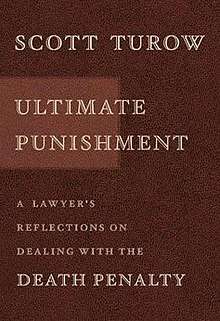Ultimate Punishment
Ultimate Punishment: A Lawyer's Reflections on Dealing with the Death Penalty or simply Ultimate Punishment is a 2003 series of autobiographical reflections regarding the death penalty. It is written by Scott Turow and marks his return to non-fiction for the first time since One L in 1977.
 | |
| Author | Scott Turow |
|---|---|
| Country | United States |
| Language | English |
| Genre | Autobiography |
| Publisher | Farrar Straus & Giroux |
Publication date | 2003 |
| Media type | Print (hardback & paperback) |
| Pages | 164 (paperback) |
| ISBN | 0-374-12873-1 (paperback) |
| OCLC | 52030296 |
| 345.73/0773 21 | |
| LC Class | KF9227.C2 T87 2003 |
| Preceded by | 'Reversible Errors |
| Followed by | 'Ordinary Heroes |
Turow bases his opinions on his experiences as a prosecutor and, in his years after leaving the United States Attorney's Office in Chicago, working on behalf of death-row inmates, as well as his two years on Illinois's Commission on Capital Punishment, charged by then-Gov. George Ryan with reviewing the state's death penalty system. Turow, a self-described "death penalty agnostic," presents both sides of the death penalty debate and admits that over time he seems to change sides, depending on the argument. Turow's reflections include:
- Thoughts on victims' rights vs. community rights
- Whether execution is a deterrent
- The possible execution of an innocent person
- If not the death penalty, what to do with the worst offenders
He also visits a maximum security prison and meets multiple-murderer Henry Brisbon, who, Turow says, "most closely resembles... Hannibal Lecter".
Reception
Ultimate Punishment received the Robert F. Kennedy Center for Justice and Human Rights 2004 Book award given annually to a novelist who "most faithfully and forcefully reflects Robert Kennedy's purposes - his concern for the poor and the powerless, his struggle for honest and even-handed justice, his conviction that a decent society must assure all young people a fair chance, and his faith that a free democracy can act to remedy disparities of power and opportunity."[1]